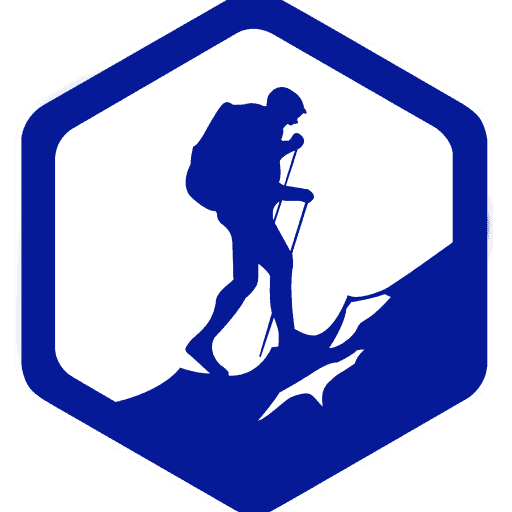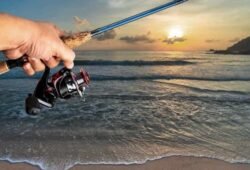Most individuals do not consider environmental elements such as weather and seasonal changes and whether they might impact the fish when planning a fishing trip. Before you load your kit and go out to the lake for a fishing excursion, take a moment to reflect. Do you think it is going to rain today? What is the current state of the water? If you are curious to know the answer to the question ‘Does rain affect saltwater fishing,’ keep reading to discover.
Contents
Impact of Weather
Many anglers are aware of the impact of weather on fish and the dangers of fishing in saltwater. From bright days to storms, you may be wondering what the ideal times to go saltwater fishing are and whether it is okay to rain during a storm.
Surprisingly, saltwater fishing in the rain does not necessarily improve your chances of catching fish. Choosing various times to fish (around the storm) can, on the other hand, have a beneficial influence on your fishing!
In the end, fish are essentially animals, just like humans. When in their natural environment, they are subjected to severe natural conditions. If you were exposed to such extreme water conditions, you would most likely be seeking somewhere to hide. While fishing in the rain is feasible, it is not suggested unless you already have the ability to identify and catch fish in such adverse conditions.
So, What Could Be The Ideal Time?
Is it worthwhile to go saltwater fishing in the rain? It is not worth it to go fishing while it is raining. The shift in air pressure connected with stormy weather affects fish with swim bladders.
Due to the pain that these low-pressure systems might cause, fish may become less active. As a result, the greatest time to fish is the day before the rain starts. Fish will aggressively feed more in order to prepare for the impending low-pressure system.
Weather systems have begun to change more regularly and with increasing severity, which we may not observe, but a professional fisherman understands. Blue skies appear one moment and then go, leaving you with roaring winds and pounding in your ears the next.
Heavy rain has very little direct effect on the fish; however, it does affect the wider habitat, which in turn influences how you fish. The surroundings react significantly to atmospheric conditions, and rainfall causes barometric pressures to vary. While it is not a precise science, barometric pressures definitely have an impact on feeding behavior.
Barometric Pressure
Barometric pressure, commonly known as atmospheric or air pressure, is the weight of the air pushing down on everything on the earth, even fish and fishermen. Variations in pressure changes indicate that the weather is changing. Rising pressure (a high-pressure weather pattern) typically indicates excellent weather. A dropping pressure (low-pressure weather pattern) is frequently an indicator of impending severe weather, such as rain.
How Does It Affect Fishing?
Just as air pressure may influence the weather, it can similarly influence the behavior of fish. Fish activity may be dramatically affected by even little fluctuations in barometric pressure. One of the primary reasons for this is that everything in the water goes down, suspends, or comes up to the surface. Because barometric pressure is the force of air above sea level, you may not imagine it has any effect on life beneath the water. However, certain fish may detect changes in air pressure owing to pressure changes in their organs.
Therefore, you may discover that you might have a more effective fishing adventure when the pressure is shifting.
Feeding Time
Fish are generally more active when the air pressure changes. This implies they will eat more both before and after a rainstorm, depending on whether the pressure on the barometer is decreasing or increasing. Fish can detect impending storms up to a day in advance.
That’s when the fishes respond and become extremely aggressive since they realize that eating in low pressure, that is, storm situations might be difficult. When the barometer begins to drop, clouds begin to sweep in, suggesting that bad weather is on the way. This is an excellent time to employ fast-moving baits and tactics.
Throughout this time, the fish will frequently be vigorously feeding prior to the commencement of the reduced pressure since they will be less capable of feeding once it occurs. Hence, rather than going saltwater fishing in the rain, try and schedule your fishing trip prior to the storm.
Low Pressure
Fortunately for us fishermen, low-pressure situations do not endure long. However, after the dropping pressure settles to a low-pressure area, the fish will withdraw to greater depths. A reason for this is to keep their swim bladders in balance.
The swimming will decelerate because the fish are uninterested in feeding; simply expressed, they will become uncomfortable. This suggests that your rate of success may be lower since the fishes are not eagerly eating. Slow things down and reduce the size of your baits when fishing. The fishes would not wish to invest much energy chasing your bait.
The deeper the fishes are in the waters, the further the effects of the low-pressure system will be felt. Slower-finesse baiting in water depths is an effective fishing strategy during this period.
What Do You Think?
Do you feel you should attempt saltwater fishing in the rain since you’ve learned whether or not it is safe? That depends on the situation!
The rain may influence how fish behave and where they travel, especially if there is a large storm that disrupts their environment. If the weather is so bad that it threatens your safety, we would recommend you to just stay home.
However, if you can take a mild to moderate shower without interfering with the water’s circulation, it is an excellent option! Because few people will be out fishing in this weather, take advantage of the fact that there will be fewer fishers.
However, we strongly advise you to go fishing either before or post the rain, which is more fruitful than fishing through one.
This is due to the fact that fishing prior to a thunderstorm has a low-pressure difference, which causes fish to go into a feeding frenzy. They are much more conspicuous and so simpler to capture. The pressure drops during the storms and then rises again when the storm passes.
However, if you still decide to go fishing during a rainstorm, below are some guidelines to keep in mind:
- l Make sure you have prepared your stormy day weather kit and that you have waterproofed all of the gear to avoid damage. While exposing oneself to the outdoors, you must also consider your safety and health!
- l Your fishing performance is also affected by the sort of lure rod you select. Brighter and louder baits will help fish detect them better. Furthermore, go fishing near inlets, floodgates, or drains, which are common places for fish. Rain delivers a lot of extra fresh water to the shore and backwaters, which frequently spills out into brackish streams via pipelines, culverts, and spillways. These water release structures may be great places to fish after and during downpours, especially if they are heavy. Torrential downpours will force a large amount of fresh water through the discharge systems, sweeping numerous baitfish and other food into the saline water. Predator fish (particularly snook) will frequently sit on the downstream side of these structures, watching for prey to be washed by so they may attack them.
- l Track the breeze to find the fish, as it might be difficult to detect them just by staring at the water. Go towards the downstream sides of the sea and regions where fish can avoid the wind’s pressures.
Read More: Not Sure About Eating Striped Bass? Read this First!
When to Go Fishing?
Even after accounting for all of these variables, you will undoubtedly be wondering when to go fishing. There are so many things to consider that making a decision might be difficult. But there is one easy answer that outweighs all others: go fishing anytime your schedule permits. Sure, you will catch more fish during sunrise and dusk, or before and after a storm.
Certainly, if you schedule your fishing to coincide with excellent weather and peak tides, you will have a greater chance of success. But the reality is that everybody has a tight schedule, a long list of responsibilities, and time constraints. So go fishing whenever you can, and keep in mind the adage, “the worst day of fishing is better than the best day of work.”
Final Thoughts
Although a good rain does not ensure that you will catch a huge amount of fish, it can considerably boost your chances, if you decide to go saltwater fishing before or after the storm. Just remember to stay cautious and avoid going fishing if lightning is present. Also, do not forget to bring your rain gear!




